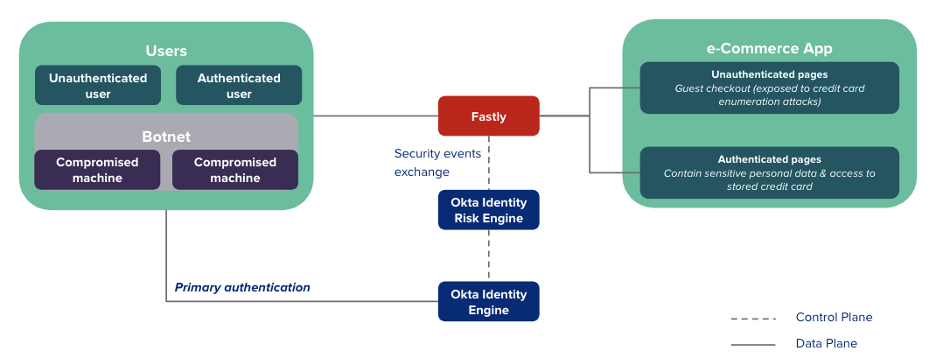
- Home
- Lifecycle Management
- Fastly
Last updated: Jun 25, 2025
Overview
Fastly’s edge cloud platform powers fast, secure, and scalable digital experiences for the world’s most popular businesses. Signal Sciences, now part of Fastly, is a leading next-gen WAF and RASP web application protection solution built to detect and stop attacks wherever you run your apps, APIs, and microservices.
Authentication and Provisioning
Fastly’s Okta integration enables you to turn on single sign-on (SSO) for Fastly products. With Fastly, you can also manage your corporation's users with enhanced provisioning functionality. Provisioning is enabled via SCIM and is only available to certain plans. With support for Okta groups, you can assign users roles and workspace/site memberships easily.
Risk Ecosystem Integration
Fastly’s Next-Gen WAF (Signal Sciences) also integrates with Okta’s Adaptive MFA product via the Risk Ecosystem API. Through this integration, risk signals that are detected by Fastly are sent to Okta’s Identity Risk Engine in real time, thereby allowing Okta to correlate suspicious and malicious IP addresses with end-user accounts and apply enforcement actions. The Risk Engine integration is only available to Fastly customers on select license tiers.

Functionality
Add this integration to enable authentication and provisioning capabilities.
Authentication (SSO)
-
API
-
Cross App Access
-
Entitlement Management
-
Event Hooks
-
Identity Security Posture Management Identity Security Posture Management helps to harden the identity attack surface proactively, by identifying vulnerabilities, prioritizing risks, and streamlining remediation.
-
Inbound Federation
-
Inline Hooks
-
Outbound Federation
-
Partial Universal Logout
-
Privileged Access Management
-
RADIUS
-
Secure Identity Integrations - Advanced Supports 4 of the following integration types for the 65+ business-critical applications: SSO, SCIM, entitlements, universal logout, workflows, and ISPM
-
Secure Identity Integrations - Fundamental Supports 3 of the following integration types for the 65+ business-critical applications: SSO, SCIM, entitlements, universal logout, workflows, and ISPM
-
Secure Identity Integrations - Strategic Supports 5+ of the following integration types for the 65+ business-critical applications: SSO, SCIM, entitlements, universal logout, workflows, and ISPM
-
Universal Logout
-
Workflow Templates
-
Workflows Connectors
-
SAML Security Assertion Markup Language is an open standard for exchanging authentication and authorization data between an identity provider (IdP) and a service provider (SP) that does not require credentials to be passed to the service provider.
-
SWA Secure Web Authentication is a Single Sign On (SSO) system developed by Okta to provide SSO for apps that don't support proprietary federated sign-on methods, SAML or OIDC.
-
WS-Federation
-
OIDC OpenID Connect is an extension to the OAuth standard that provides for exchanging Authentication data between an identity provider (IdP) and a service provider (SP) and does not require credentials to be passed from the Identity Provider to the application.
Provisioning
-
Create Creates or links a user in the application when assigning the app to a user in Okta.
-
Update Okta updates a user's attributes in the app when the app is assigned. Future attribute changes made to the Okta user profile will automatically overwrite the corresponding attribute value in the app.
-
Attribute Sourcing The application can be defined as the source of truth for a full user profile or as the source of truth for specific attributes on a user profile.
-
Deactivate Deactivates a user's account in the app when it is unassigned in Okta or their Okta account is deactivated. Accounts can be reactivated if the app is reassigned to a user in Okta.
-
Sync Password Push either the users Okta password or a randomly generated password to the app. This feature is not required for all federated applications as user authentication takes place in Okta, however some apps still require a password.
-
Group Push Push existing Okta groups and their memberships to the application. Groups can then be managed in Okta and changes are reflected in the application.
-
Group Linking Link Okta groups to existing groups in the application. Simplifies onboarding an app for Okta provisioning where the app already has groups configured.
-
Schema Discovery Import the user attribute schema from the application and reflect it in the Okta app user profile. Allows Okta to use custom attributes you have configured in the application that were not included in the basic app schema.
-
Attribute Writeback When the application is used as a profile master it is possible to define specific attributes to be sourced from another location and written back to the app. For example the user profile may come from Active Directory with phone number sourced from another app and written back to Active Directory.